- Home
- Victor Hugo
Told Under Canvas Page 4
Told Under Canvas Read online
Page 4
CHAPTER X.
Every day at the same hour I visited him. His position rendered me very uneasy, for in spite of all our prayers, my uncle obstinately refused to withdraw his complaint. I did not conceal my fears from Pierrot, who however listened to them with indifference.
Often Rask would come in with a large palm-leaf tied round his neck. His master would take it off, read some lines traced upon it in an unknown language, and then tear it up. I had ceased to question him in any matters connected with himself.
One day as I entered he took no notice of me, he was seated with his back to the door of the cell, and was whistling in melancholy mood the Spanish air, “Yo que soy contrabandista” (“A smuggler am I”). When he had completed it, he turned sharply round to me, and exclaimed—
“Brother, if you ever doubt me, promise that you will cast aside all suspicion on hearing me sing this air.”
His look was earnest, and I promised what he asked, without noticing the words upon which he laid so much stress, “If ever you doubt me.” He took the empty half of a cocoa-nut which he had brought in on the day of my first visit, and had preserved ever since, filled it which palm wine, begged me to put my lips to it, and then drank it off at a draught. From that day he always called me brother.
And now I began to cherish a hope of saving Pierrot’s life. My uncle’s anger had cooled down a little. The preparations for the festivities, connected with his daughter’s wedding had caused his feelings to flow in gentle channels. Marie joined her entreaties to mine. Each day I pointed out to him that Pierrot had had no desire to insult him, but had merely interposed to prevent him from committing an act of perhaps too great severity; that the negro had at the risk of his life saved Marie from the alligator; and besides, Pierrot was the strongest of all his slaves (for now I sought to save his life not to obtain his liberty), that he was able to do the work of ten men, and that his single arm was sufficient to put the rollers of a sugar-mill in motion. My uncle listened to me calmly, and once or twice hinted that he might not follow up his complaint.
I did not say a word to the negro of the change that had taken place, hoping that I should soon be the messenger to announce to him his restoration to liberty.
What astonished me greatly was, that though he believed that he was under sentence of death, yet he made no effort to avail himself of the means of escape that lay in his power. I spoke to him of this.
“I am forced to remain,” said he simply, “or they would think that I was afraid.”
CHAPTER XI.
One morning Marie came to me, she was radiant with happiness, and upon her gentle face was a sweeter expression than even the joys of pure love could produce, for written upon it was the knowledge of a good deed.
“Listen,” said she. “In three days we shall be married. We shall soon——”
I interrupted her.
“Do not say soon, Marie, when there is yet an interval of three days.”
She blushed and smiled.
“Do not be foolish, Leopold,” replied she. “An idea has struck me which has made me very happy. You know that yesterday I went to town with my father to buy all sort’s of things for our wedding. I only care for jewels because you say that they become me. I would give all my pearls for a single flower from the bouquet which that odious man with the marigolds destroyed. But that is not what I meant to say. My father wished to buy me everything that I admired, and amongst other things there was a basquina of Chinese satin embroidered with flowers, which I admired. It was very expensive. My father noticed that the dress had attracted my attention. As we were returning home, I begged him to promise me a boon after the manner of the knights of old—you know how he delights to be compared to them. He vowed on his honour that he would grant me whatever I asked, thinking of course that it was the basquina of Chinese satin; but no, it is Pierrot’s pardon that I will ask for as my nuptial present.”
I could not refrain from embracing her tenderly. My uncle’s word was sacred, and whilst Marie ran to him to claim its fulfilment, I hastened to Fort Galifet to convey the glad news to Pierrot.
“Brother,” exclaimed I, as I entered, “Rejoice, your life is safe; Marie has obtained it as a wedding present from her father.”
The slave shuddered.
“Marie—wedding—my life! What reference have these things to each other?”
“It is very simple,” answered I. “Marie, whose life you saved, is to be married——.”
“To whom?” exclaimed the negro, a terrible change coming over his face.
“Did you not know that she was to be married to me?”
His features relaxed.
“Ah, yes,” he replied; “and when is the marriage to take place?”
“On August the 22nd.”
“On August the 22nd! Are you mad?” cried he, with terror painted in his countenance.
He stopped abruptly; I looked at him with astonishment. After a short pause he clasped my hand—
“Brother,” said he, “I owe you so much that I must give you a warning. Trust to me, take up your residence in Cap, and get married before the 22nd.”
In vain I entreated him to explain his mysterious wards.
“Farewell,” said he, in solemn tones; “I have perhaps said too much, but I hate ingratitude even more than perjury.”
I left the prison a prey to feelings of great uneasiness; but all these were soon effaced by the thoughts of my approaching happiness.
That very day my uncle withdrew his charge, and I returned to the Fort to release Pierrot. Thaddeus, on hearing the noise, accompanied me to the prisoner’s cell, but he was gone! Rask alone remained, and came up to me wagging his tail. To his neck was fastened a palm-leaf, upon which were written these words: “Thanks; for the third time you have saved my life. Do not forget your promise, friend;” whilst underneath, in lieu of signature, were the words: “Yo que soy contrabandista.”
Thaddeus was even more astonished than I was, for he was ignorant of the enlargement of the loophole, and firmly believed that the negro had changed himself into a dog. I allowed him to remain in this belief, contenting myself with making him promise to say nothing of what he had seen. I wished to take Rask home with me, but on leaving the Fort he plunged into a thicket and disappeared.
CHAPTER XII.
My uncle was furiously enraged at the escape of the negro. He ordered a diligent search to be made for him, and wrote to the Governor placing Pierrot entirely at his disposal should he be re-taken.
The 22nd of August arrived. My union with Maria was celebrated with every species of rejoicing at the parish church of Acul. How happily did that day commence from which all our misfortunes were to date!
I was intoxicated with my happiness, and Pierrot and his mysterious warning were entirely banished from my thoughts. At last the day came to a close, and my wife had retired to her apartments; but for a time duty forbade me joining her there. My position as a captain of militia required me that evening to make the round of the guards posted about Acul. This nightly precaution was absolutely necessary owing to the disturbed state of the colony, caused by occasional outbreaks amongst the negroes, which, however, had been promptly repressed. My uncle was the first to recall me to the recollection of my duty. I had no option but to yield, and, putting on my uniform, I went out. I visited the first few guards without discovering any cause of alarm; but towards midnight, as half buried in my own thoughts I was patrolling the shores of the bay, I perceived upon the horizon a ruddy light in the direction of Limonade and Saint Louis du Morin. At first my escort attributed it to some accidental conflagration; but in a few moments the flames became so vivid, and the smoke rising before the wind grew so thick, that I ordered an immediate return to the Fort to give the alarm, and to request that help might be sent in the direction of the fire.
In passing through the quarters of the negroes who belonged to our estate, I was surprised at the extreme disorder that reigned
there. The majority of the slaves were afoot, and were talking together with great earnestness. One strange word was pronounced with the greatest respect—it was Bug-Jargal—and occurred continually in the almost unintelligible dialect that they used.
From a word or two which I gathered here and there, I learned that the negroes of the northern districts were in open revolt, and had set fire to the dwelling-houses and the plantations on the other side of Cap.
Passing through a marshy spot, I discovered a quantity of axes and other tools, which would serve as weapons, hidden amongst the reeds. My suspicions were now thoroughly aroused, and I ordered the whole of the Acul militia to get under arms, and gave the command to my lieutenant, and, whilst my poor Marie was expecting me, I, obeying my uncle’s orders, who, as I have mentioned, was a member of the Provincial Assembly, took the road to Cap, with such soldiers as I had been able to muster. I shall never forget the appearance of the town as we approached. The flames from the plantations which were burning all around it, threw a lurid light upon the scene, which was only partially obscured by the clouds of smoke which the wind drove into the narrow streets. Immense masses of sparks rose from the burning heaps of sugar-cane, and fell like fiery snow on the roofs of the houses, and on the rigging of the vessels at anchor in the roadsteads, at every moment threatening the town of Cap with as serious a conflagration as was already raging in its immediate neighbourhood. It was a terrible sight to witness the terror-stricken inhabitants exposing their lives to preserve from so destructive a visitant their habitations, which perhaps was the last portion of property left to them; whilst, on the other hand, the vessels, taking advantage of a fair wind, and fearing the same fate, had already set sail, and were gliding over an ocean reddened by the flames of the conflagration.
CHAPTER XIII.
Stunned by the noise of the minute-guns from the Fort, by the cries of the fugitives, and the distant crash of falling buildings, I did not know in what direction to lead my men; but, meeting in the main square the captain of the Yellow Dragoons, he advised me to proceed direct to the Governor.
Other hands have painted the disasters of Cap, and I must pass quickly over my recollections of them, written as they are in fire and blood. I will content myself with saying that the insurgent slaves were already masters of Dondon, of Terrier-Rouge, of the town of Ouanaminte, and of the plantation of Limbé. This last news filled me with uneasiness, owing to the proximity of Limbé to Acul. I made all speed to the Government House. All was in confusion there. I asked for orders, and begged that instant measures might be taken for the security of Acul, which I feared the insurgents were already threatening. With the Governor, Monsieur de Blanchelande, were M. de Rouvray, the Brigadier, and one of the largest landholders in Cap; M. de Touzard, the Lieutenant-Colonel of the Regiment of Cap; a great many members of the Colonial and the Provincial Assemblies, and numbers of the leading colonists. As I entered, all were engaged in a confused argument.
“Your Excellency,” said a member of the Provincial Assembly, “it is only too true, it is the negroes, and not the free mulattoes; it has often been pointed out that there was danger in that direction.”
“You make that statement without believing in its truth,” answered a member of the Colonial Assembly, bitterly, “and you only say it to gain credit at our expense. So far from expecting a rising of the slaves, you got up a sham one in 1789. A ridiculous farce in which with a supposed insurgent force of three thousand slaves, one national volunteer only was killed, and that most likely by his own comrades.”
“I repeat,” replied the Provincial, “that we can see farther than you. It is only natural. We remain upon the spot and study the minutest details of the colony, whilst you and your Assembly hurry off to France to make some absurd proposals; which are often met with a national reprimand Ridiculus mus.”
The member of the Colonial Assembly answered with a sneer—
“Our fellow citizens re-elected us all without hesitation.”
“It was your Assembly,” retorted the other, “that caused the execution of that poor devil who neglected to wear a tricolored cockade in a café, and who commenced a petition for capital punishment to be inflicted on the mulatto Lacombe with that worn-out phrase, ‘In the name of the Father, of the Son, and the Holy Ghost.’ ”
“It is false,” exclaimed the other; “there has always been a struggle of principles against privileges between our assemblies.”
“Ha, Monsieur, I see now you are an Independent.”
“That is tantamount to allowing that you are in favour of the White Cockade: I leave you to get out of that confession as best you may.”
More might have passed, but the Governor interposed.
“Gentlemen, gentlemen, what has this to do with the present state of affairs, and the pressing danger that threatens us? Listen to the reports that I have received. The revolt began this night at ten o’clock amongst the slaves in the Turpin Plantation. The negroes, headed by an English slave named Bouckmann, were joined by the blacks from Clement, Trémés, Flaville, and Nöe. They set fire to all the plantations, and massacred the colonists with the most unheard-of barbarities. By one single detail I can make you comprehend all the horrors accompanying this insurrection. The standard of the insurgents is the body of a white child on the point of a pike.”
A general cry of horror interrupted the Governor’s statement.
“So much,” continued he, “for what has passed outside the town. Within its limits all is confusion. Fear has rendered many of the inhabitants forgetful of the duties of humanity, and they have murdered their slaves. Nearly every one have confined their negroes behind bolts and bars. The white artisans accuse the free mulattoes of being participators in the revolt, and many have had great difficulty in escaping from the fury of the populace. I have had to grant them a place of refuge in a church, guarded by a regiment of soldiers; and now, to prove that they have nothing in common with the insurgents, they asked that they may be armed and led against the rebels.”
“Do nothing of the kind, your Excellency,” cried a voice which I recognized as that of the planter with whom I had had a duel. “Do nothing of the kind; give no arms to the mulattoes.”
“What, do you not want to fight?” asked a planter, with a sneer.
The other did not appear to hear him, and continued: “These men of mixed blood are our worst enemies, and we must take every precaution against them. It is from that quarter that the insurgents are recruited; the negroes have but little to do with the rising.” The poor wretch hoped by his abuse of the mulattoes to prove that he had nothing in common with them, and to clear himself from the imputation of having black blood in his veins; but the attempt was too barefaced, and a murmur of disgust rose up on all sides.
“Yes,” said M. de Rouvray, “the slaves have something to do with it, for they are forty to one; and we should be in a serious plight if we could only oppose the negroes and the mulattoes with whites like you.”
The planter bit his lips.
“General,” said the Governor, “what answer shall be given to the petition: shall the mulattoes have the arms?”
“Give them weapons, your Excellency; let us make use of every willing hand. And you, sir,” he added, turning to the colonist of doubtful colour. “Go arm yourself, and join your comrades.”
The humiliated planter slunk away, filled with concentrated rage.
But the cries of distress which rang through the town reached even to the chamber in which the council was being held. M. de Blanchelande hastily pencilled a few words upon a slip of paper, and handed it to one of his aides-de-camp, who at once left the room.
“Gentlemen, the mulattoes will receive arms; but there are many more questions to be settled.”
“The Provincial Assembly should at once be convoked,” said the planter who had been speaking when first I entered.
“The Provincial Assembly?” retorted his antagonist; “what is the Provincial A
ssembly?”
“You do not know because you are a member of the Colonial Assembly,” replied the favourer of the White Cockade.
The Independent interrupted him. “I know no more of the Colonial than the Provincial—I only recognize the General Assembly.”
“Gentlemen,” exclaimed a planter, “whilst we are losing time with this nonsense, tell me what is to become of my cotton and my cochineal?”
“And my indigo at Lumbé?”
“And my negroes, for whom I paid twenty dollars a-head all round?” said the captain of a slave ship.
“Each minute that you waste,” continued another colonist, “costs me ten quintals of sugar, which at seventeen piastres the quintal makes one hundred and thirty livres, ten sous, in French money, by the——”
Here the rival upholders of the two Assemblies again sought to renew their argument.
“Morbleu,” said M. de Rouvray in a voice of thunder, striking the table violently, “what eternal talkers you are! What do we care about your two assemblies. Summon both of them, your Excellency, and I will form them into two regiments, and when they march against the negroes we shall see whether their tongues or their muskets make the most noise.”
Then turning towards me he whispered—
“Between the two Assemblies and the Governor nothing can be done. These fine talkers spoil all, as they do in Paris. If I was seated in his Excellency’s chair, I would throw all these fellows out of the window, and with my soldiers and a dozen crosses of St. Louis to promise, I would sweep away all the rebels in the island. These fictitious ideas of liberty, which they have all run mad after in France, do not do out here. Negroes should be treated so as not to upset them entirely by sudden liberation; all the terrible events of to-day are merely the result of this utterly mistaken policy, and this rising of the slaves is the natural result of the taking of the Bastille.”

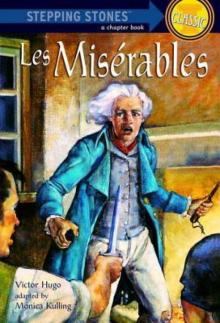 Les Miserables
Les Miserables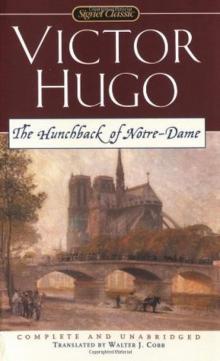 The Hunchback of Notre-Dame
The Hunchback of Notre-Dame The Man Who Laughs
The Man Who Laughs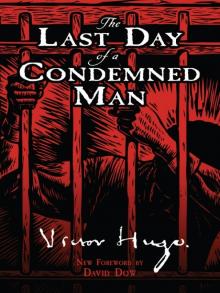 The Last Day of a Condemned Man
The Last Day of a Condemned Man The Toilers of the Sea
The Toilers of the Sea Waterloo
Waterloo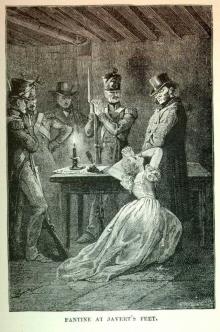 Les Misérables, v. 1/5: Fantine
Les Misérables, v. 1/5: Fantine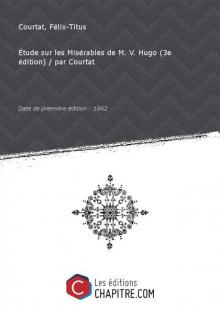 Les Misérables, v. 3/5: Marius
Les Misérables, v. 3/5: Marius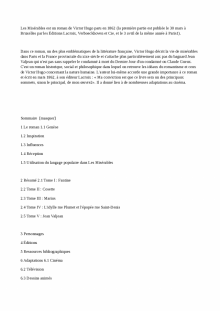 Les Misérables, v. 2/5: Cosette
Les Misérables, v. 2/5: Cosette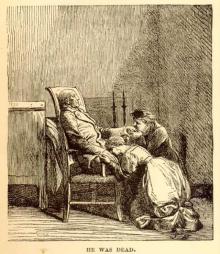 Les Misérables, v. 5/5: Jean Valjean
Les Misérables, v. 5/5: Jean Valjean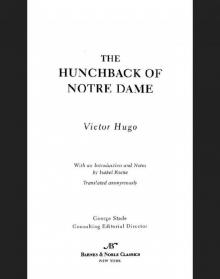 Hunchback of Notre Dame (Barnes & Noble Classics Series)
Hunchback of Notre Dame (Barnes & Noble Classics Series)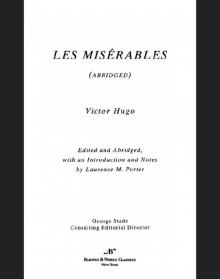 Les Miserables (abridged) (Barnes & Noble Classics Series)
Les Miserables (abridged) (Barnes & Noble Classics Series)